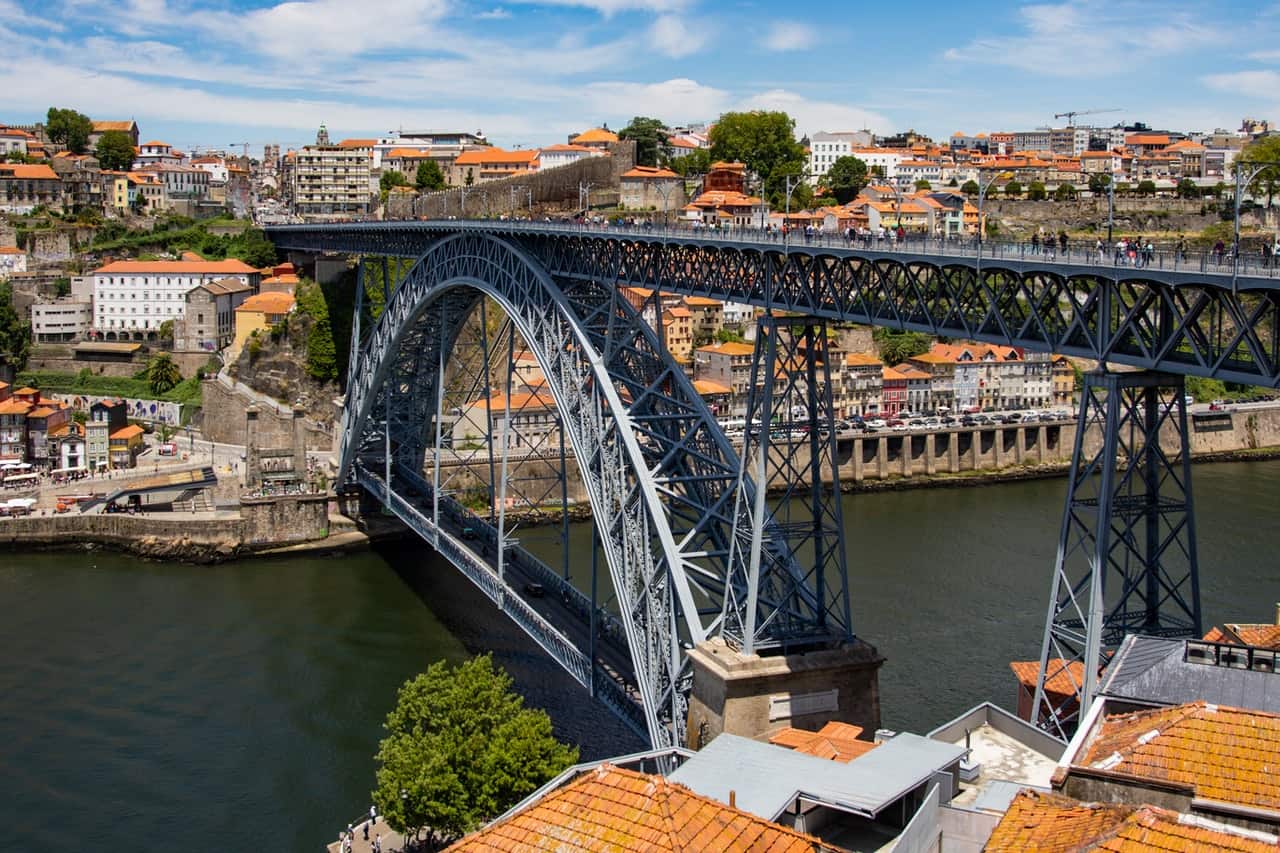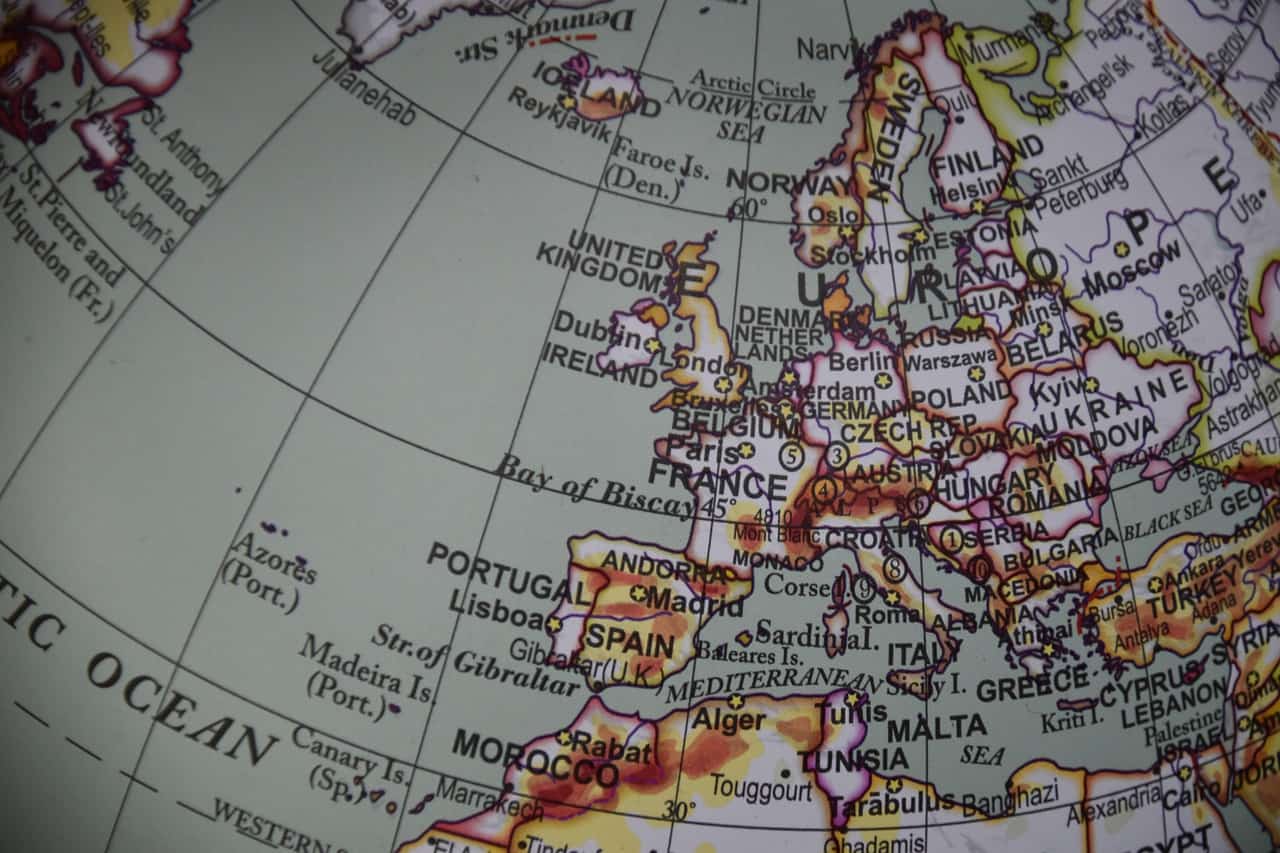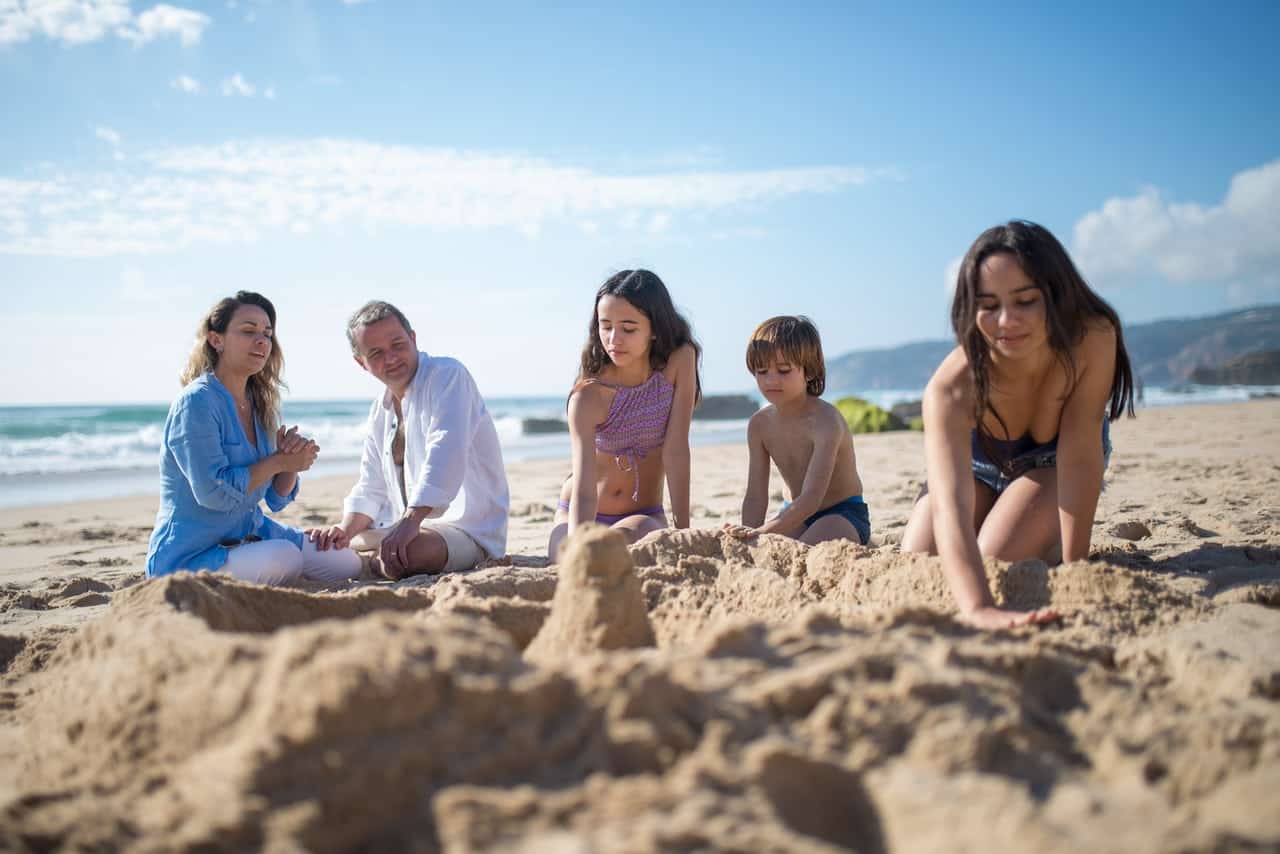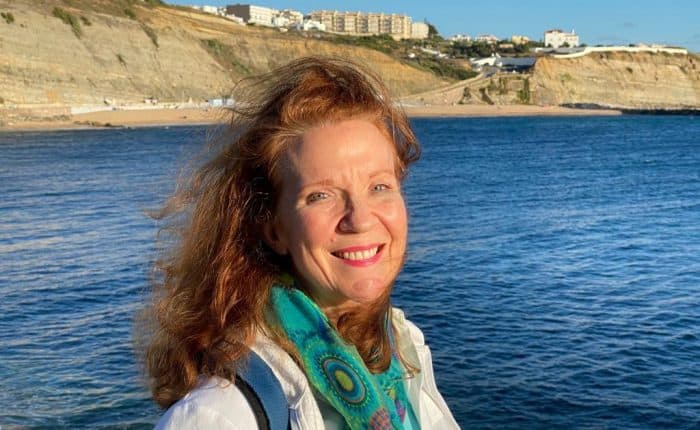If you are considering a move to Portugal but haven’t taken the leap because you are feeling unequipped or lacking in courage, you are going to want to read this interview with Charlotte Tweed and Rebel Holiday.
You CAN overcome your fear with the power of learning about the culture before you go. Be persistent, be determined. Tackle the problem. Overcome the anxiety of moving to a different country and take the bridge to becoming an expat in Portugal sooner than later.

Charlotte Tweed: Hello. I am Charlotte Tweed with Escape Artist, and today I am interviewing Rebel Holiday, an American expat in Portugal. Thank you for being here, Rebel.
Rebel Holiday: My pleasure, Charlotte.
Charlotte Tweed: How long have you lived in Portugal?
Rebel Holiday: We took a house in Cascais in June of 2009. It’s been 12 years now. My husband had been here a few times and brought our son, but I’d only been here once prior. And that was the trip when we looked for and found a house. We rented a house in the beginning. When it was time to move in, Jack was leading an expedition somewhere in the world, so Jackson and I arrived with our suitcases in hand at the home. It was an adventure, “Here we go!”
Charlotte Tweed: Wow. You’ve been to so many countries. What made you decide to settle in Portugal?
Rebel Holiday: When we first came here, I didn’t plan necessarily to live here the rest of my life. We didn’t have a plan beyond spending a year or two here. Our son Jackson would learn Portuguese, complete his 12th grade year, and graduate from high school. He was already fluent in Spanish, which I made sure he learned from birth. He had become fluent on his own in French. And he lived in France for a year with a French family on a foreign exchange student program.
He was passionate about languages. He knew Latin and Greek. Some Italian, not fluently, but very well. He wanted to learn another language and Portuguese was a good choice. Then he wanted to do a gap year abroad, so it became two years and then we liked it. So, I didn’t even really apply for proper visas, which was a mistake, but I managed to stay within the rules. Since we were coming and going so much in the beginning, it worked out. I had to be three weeks here and three weeks in the U.S. because I was still running companies there and working with consulting clients. It was kind of amazing, really, the experience of living on two continents with five hours of ocean in between.
Charlotte Tweed: Five hours doesn’t sound that terribly long.
Rebel Holiday: It wasn’t bad, I could leave Newark at 8pm and arrive early in the morning. It’s like being bi-coastal in the U.S. or Canada. I grew up in Southern California and I had a business there. When our family moved to Virginia in 1990, our older son started school there, and I was flying back and forth. Frankly, the difference between commuting, so to speak, from San Diego to Washington D.C. compared to Portugal and New York, was about the same. It is a little bit longer of a flight, but maybe by an hour. It’s not that much.
Charlotte Tweed: Yeah. I understand that completely.
Rebel Holiday: It worked.
Charlotte Tweed: Yes. Because with me being Canadian, it’s the same to fly across the country. It’s actually closer to fly to Mexico than it is to fly across Canada.
Rebel Holiday: Oh, interesting. Sure. That makes sense to me. Exactly.
 Charlotte Tweed: You had mentioned language. I have heard that Portuguese is one of the most difficult languages to learn. Is this true?
Charlotte Tweed: You had mentioned language. I have heard that Portuguese is one of the most difficult languages to learn. Is this true?
Rebel Holiday: I wouldn’t say it’s an easy language, but are any languages “easy?” I speak Portuguese fluently now, but it took some effort. Sure, Spanish is easier. So is learning languages when you’re a child. I grew up in San Diego and was naturally interested in Spanish. For me, talking to people and learning about them is an important part of how I look at the world. I started learning Spanish at 9 years old in elementary school. In Jr. High, I took the public bus to school because I lived out of the district. When I felt like talking, I’d look around for a friendly-looking Mexican lady and sit near her. After a while, I’d smile and say “Hola…” and strike up a conversation. The ladies seemed to like it and I learned a lot that way. By the end of ninth grade, I was comfortably speaking Spanish. For those who speak it, Spanish is related so it did help me learn Portuguese.
Sure, Portuguese may not be an “easy” language, but it’s not that difficult. Structurally, it’s a lot like Spanish. For instance, in terms of how sentences are organized. A lot of adjectives and adverbs are identical. Many verbs are similar to Spanish and even the way you conjugate verbs is similar.
The trickiest part about Portuguese is the pronunciation. When I first got here, it was harder than I expected. I used my phrase books to learn basics. Then I decided to focus on learning to make the sounds. So, I’d practice just the sounds. The secret is trying.
Charlotte Tweed: Okay.
Rebel Holiday: I would memorize expressions and would try to speak to anyone I could. You know, it took some time. But now my Portuguese is pretty fluent. I can understand and talk about most anything, even business matters. You have to try though and that’s the key, but it’s worth it. And, I keep learning all the time.
I met an American woman who had spent several years at the embassy in Lisbon and was leaving Portugal to go back to the U.S. I asked her, “Do you have any regrets? A missed opportunity or something you wished you had done while you were in Portugal?” And she said, “Yes, I wish I had bothered to learn Portuguese.” Personally, I think if people try, they can learn it. People are much smarter than they realize, and they’re hard on themselves, especially when it comes to languages. But you have to be willing to make mistakes. Even look stupid, nobody cares.
Charlotte Tweed: But a lot of people aren’t willing to look stupid, and I think that’s a challenge in itself.
Rebel Holiday: I know, it’s true. But here’s the thing. I’ve been to 86 countries because of my husband, Jack Wheeler’s expedition travel business, Wheeler Expeditions. I learn a few words everywhere I go, even if I’m not likely to go back. It helps you connect with people even if it’s simply saying, “Thank you, please, or hello” in their language. They usually feel honored that you care enough to try.
Charlotte Tweed: Exactly.
Rebel Holiday: I’ve been to a few countries where if you try to speak the language, but don’t speak it well, they’re not very helpful. But in Portugal, if you just try at all they are so kind and helpful. They will bend over backwards to try to understand you. It makes a big difference.
Charlotte Tweed: For sure. And I think that would be reassuring to some people, because language can be a challenge to those considering a move to a different country.
Rebel Holiday: You know what else, Charlotte?
Charlotte Tweed: Yes?
Rebel Holiday: Here’s one more thing about language, we’ve been here all these years, and my husband is truly a genius when it comes to the world, history, geography, science, and all kinds of things. When it comes to languages, he says he doesn’t have that gene. I think he doesn’t try much and he relies on me. He does just fine! After all these years, there are a few expressions he can say, but he says everybody speaks English! That’s true in the city areas — Lisbon, Cascais, Sintra, Porto, and definitely the Algarve — many people speak English and some of them speak very well.
Charlotte Tweed: Very true. I think you could pretty much say that about any European country I’ve been to.
Rebel Holiday: Yes, you’re correct. Some English is spoken especially by people under about 50. The older generation learned French in school, but the younger people have been watching movies and listening to songs in English all their lives.
Charlotte Tweed: Exactly. What are some other challenges that you faced when you moved to Portugal?
Rebel Holiday: This one comes to mind. If you walk into a grocery store in America or Canada and you’re looking for the canned artichokes, you can walk up to somebody who works in the store and say, “Excuse me. Where are the canned artichokes?” And they’ll tell you. In Portugal, if you walk up to a person in the store and just start asking them a question, they often stop, smile, and say, “Boa tarde.” Good afternoon. “Bom Dia.” Good morning. So that was my clue. I realized, that my approach was not considered good manners. They greet each other first, then say what they want.
Charlotte Tweed: And that’s one of the cultural things.
Rebel Holiday: Yes. That’s a cultural thing. What are the other difficulties? I think it really is important to have somebody to assist you when you go to live in a foreign country. Someone to help you set up your life, set up your bank account, find a doctor, those sorts of things. I found a woman who would help me when I needed it for quite a while, just part time, but it was very helpful.
We take it for granted in our home country but navigating new countries with the names of everything in foreign languages, so GPS makes a big difference. What else? There’s a different way that they drive here. The middle lane on the freeway, for example, is a passing lane. You’re not supposed to drive in that lane. You move into that lane, you pass somebody, and then you move back to the right.
Charlotte Tweed: Interesting. Okay.
Rebel Holiday: What’s easy is finding good food in Portugal. Good fresh produce, fresh fish, good wine, plenty of it.

Portugal now is very used to foreigners coming to live here. When I came here in 2009, it was not as common. Portuguese people used to ask me, “Why do you want to live here?” And I’d say, “Well, because it’s wonderful.” They didn’t quite get it. Now, seeing so many foreigners want to come live here has made the Portuguese themselves appreciate and value their own country so much more.
Overall, Charlotte, it was a relatively easy transition. Portugal is a first-world country. It’s like California was when I was a little girl, in terms of the weather, the climate, the landscape, the plants, the ocean. Of course, there’s a lot history, a different culture, and it’s Portuguese, so that makes it interesting.
Charlotte Tweed: You had brought up the expat process earlier. What are some things that surprised you during that expat process?
Rebel Holiday: We didn’t know that we were going to like it so much that we would stay, so we didn’t get the visas we needed at the beginning. Later we had to do that. It’d be difficult to do that now, unless you were just coming for a few weeks here and there. You definitely want to be organized before you decide to move to a foreign country. And you’re going to need your birth certificate, your marriage certificate, your no-criminal record report. You’re going to need the same documents that most countries require. And you may as well get them lined up, for example.
Charlotte Tweed: Exactly. So do it before you leave, because you’re going to need them.
Rebel Holiday: Yes. And, ever since COVID, the U.S. government has become slower at responding to these requests, so you may as well start early. Check the rules, they can change, but I’d start getting all those basic documents you’re going to need.
There are a lot of expats here now. Some people might want to make some contacts here in advance. One good way to make contacts is through a social network website like InterNations, because that’s a friendly group of foreigners from all over, and they have been through the adjustment process. Also, I know Escape Artist has consulting services that help people. And that would be a good way to go. I’d definitely line up an attorney. And attorneys now are used to assisting people with their visa and that aspect of the transition.
Charlotte Tweed: Excellent advice. What are some of the misconceptions that people tend to have about Europe, do you think?
Rebel Holiday: It’s hard to know what people’s misconceptions are. However, I have seen sometimes Americans compare everything to the States. Wondering why isn’t it the way it is back in the U.S.? It’s probably human nature to compare to what we know, but it’s not the best way to look at a new place because every place is different. Portugal to me is less different than a lot of places.
I lived in Bulgaria for several months, when my son was living there a few years ago. I got an Airbnb apartment there, a phrase book, and tried to, go with the flow as much as I could. And it’s quite different – the language uses the Cyrillic alphabet, so I had to learn it to read anything. It’s important to just learn about a place no matter where you go. Okay, here’s an example. In Portugal, lunch is from 1:00 to 3:00 every day. In some places, especially in the villages and in smaller towns, some stores will close between 1:00 and 3:00.
Charlotte Tweed: Yes.
Rebel Holiday: I’ve heard people say, “Oh, why is that store closed? It shouldn’t be closed.” It’s the custom. So don’t stress out over it. Just realize that it’s the culture and that’s the way they do it. When you see a country that’s different, notice the differences, learn about them, and just accept that’s reality. And really there’s no place like America, honestly. To me, Canada is the most similar place to the U.S., and I can say this because you’re Canadian. It’s still a bit different, but I find it the most similar.
Charlotte Tweed: Yes. I would agree. And I’ve experienced what you mentioned about the closing 1:00 to 3:00, when we were in Spain and the stores would close for siesta. And a lot of them actually didn’t even reopen. So if you didn’t get there in the morning, you didn’t get what you needed.
Rebel Holiday: Well, at least the Portuguese do reopen and stay open later. Another thing is dinner is later here than most Americans are used to. It’s not as late as Spain, which dinner can start at 10:00, even 11:00 at night in Spain. In Portugal, almost nobody goes to a restaurant at 7:30. And I would say 8:00 or 9:00 is typical.
Charlotte Tweed: I think another misconception that people have, or North Americans have, is where Portugal is, and how close it is in relation to other European countries.
Rebel Holiday: Oh, you’re absolutely right, Charlotte. When I first moved here, I’d be back in the D.C. area. Some people knew that I had moved, but they weren’t exactly sure where. So, people would say, “Where’d you move?” And I’d say, “Portugal.” And they’d say, “Oh, Portugal, Portugal.” And I could see, they were racking their brain trying to remember where Portugal was. And sometimes I’d give them a clue, “Well it’s next to Spain.” They’d say, “Oh yeah, okay.” Yes. Portugal is very accessible from the United States. It’s probably the most accessible, similar to England. In fact, the most westerly tip of Europe, is 20 minutes from our house in Sintra.
You’re right, Portugal is close to many countries in Europe. Within two or three hours you can be in many countries. And it’s pretty easy to travel within the EU generally. I was fairly young the first time I was in Europe, but it was not so easy because you had show I.D. and change money every time you crossed a border. Now, you can go to Spain, France, Belgium, Italy, Germany, many places, as easily as you go to another State in the U.S., even for the weekend.
Charlotte Tweed: Right. And it’s interesting that you say so many people don’t know where Portugal is, but it’s right at the center of the world map.

Rebel Holiday: It’s a great location for our international travel business. We do expeditions all over, Asia, Europe, Africa. My husband, Jack Wheeler, just got back from leading a safari. The world is such a big place, and, you are right, Portugal’s a great location.
Charlotte Tweed: Outstanding. For those aspiring to become expats in Portugal, what is one piece of advice that you would give them?
Rebel Holiday: If you are drawn to it, do it. The only way to know how much you’d like it is to give it a try. I feel fortunate to have had the opportunity to grow up when and where I did. And yet, I know how big, beautiful, and amazing the world is. To me, life is about new adventures and new experiences. Why not go new places and meet new people?
It may interest readers to know Portugal is consistently rated the 3rd or 4th safest country in the entire world. And it’s one of the cleanest. The people are some of the nicest, kindest people I’ve been around. These days, after high school or college, our kids often take a gap year. Why not give yourself a gap year? You might be really amazed at how much less stress there is.
Oh, that’s a big thing. The stress level, I believe, in the United States has increased dramatically and consistently, since I lived there. And it’s even escalated more recently. But Portugal is like a place a little bit out of time. Of course, you can find or create stress anywhere, but it’s easier to stay out of that mode here. I’ve actually enjoyed creating a new life. And I’ve gone back and forth a lot, but in general, I’m just happy to be in Portugal.
Charlotte Tweed: Looking ahead, what do you see the future of life being like in Portugal is compared to North America?
Rebel Holiday: Well, I wish the best for my birth country. Actually, I wish the best for the whole world. Although I wish the best for North America, they are dealing with a lot of challenges. I find Portugal to be a safer, calmer place. To me, the values in Portugal line up well with my upbringing and what I care about. The Portuguese make family a priority. Here’s a cultural insight. It seems when they have to get out of doing something, the perfect excuse is always your family. “My mother needs me. My son needs me to do something. I have to drive my aunt to the doctor.” They never question those excuses!

You see families gathering together in the park on Sundays, in the shopping malls on Saturday. On the beach any time there’s sun. The children are included in activities and tend to be very well behaved. My theory is that because the parents and grandparents spend a lot of time with the children and pay a lot of attention to their children, it makes a difference. They don’t have their nose buried in their phones all the time. So often in U.S. restaurants you see people at the table looking at their phones instead of talking to each other. The Portuguese tend to talk to each other. You do see some college-age people at a table looking at their phones, but not as much.
Charlotte Tweed: Interesting.
Rebel Holiday: They put a big value on family. The population is heavily Christian. Although, it’s culturally Christian, I find that the Portuguese have a healthy “live and let live” attitude. I don’t think they particularly care what religion somebody is or about the details of their personal lives. I just don’t think they care about any of that. If they like you, they like you. They treat people like people and are quite welcoming to foreigners.
Here’s a funny cultural point, sometimes if you try to tip somebody who helps you, they’ll say, “Oh no, that’s okay” and turn down a tip. I think it’s just not necessary in their culture. If you see somebody who, for example, needs directions, several people stop to help. People here like to help each other, whether it’s carrying something, changing a flat tire, or giving directions. They like to help.
Charlotte Tweed: That sounds fantastic. Just fantastic. I know I want to go to Portugal. Portugal’s on my list for a possible expat destination.
Rebel Holiday: Yes.
Charlotte Tweed: You’ve convinced me today. You’ve given us huge insight on what it is like to live in Portugal.
Rebel Holiday: Oh, I have another thing to say.
Charlotte Tweed: Yes?
Rebel Holiday: In general, I would take the medical care here over America’s any day. America has some brilliant doctors and nurses, yet many seem very pressed for time and stressed.
Charlotte Tweed: Great point.
Rebel Holiday: Even the doctors here take the time to ask questions, listen, and talk to you. You’re not just a number. Even for private health care, the prices are fairly reasonable. For about 120 euro a month you can get private medical insurance, far less than what I paid in the U.S. The clinics and hospitals I’ve seen are new and nice. Usually there’s a 10 or a 20 euro co-pay when I see a doctor. In private health care most of the doctors speak English in addition to Portuguese. Or, you can ask for one who does. There’s also a public health care system, which strangely enough does seem to work fairly well from what I hear. I haven’t used it, but any resident can. The Portuguese I’ve asked generally speak favorably about it.
A couple years ago, a friend of mine, a medical professional from America who moved here, had some strange symptoms and had to go into the hospital. He was there for a couple weeks, some gastrointestinal problem. He was very impressed with the quality of care he received. He told me they treated him very well, were attentive and brought him three “good” meals a day, for a hospital. He said the bill was a tenth of what it would be in America.
Charlotte Tweed: Impressive.
Rebel Holiday: There are a lot of advantages. I don’t think anybody would really dislike it here. It’s not for everyone, but if you’re willing to be open-minded and curious, give it a try. You could always move back.
Charlotte Tweed: That’s right. Embrace the culture and embrace the people.
Rebel Holiday: If living abroad appeals to you, try it. You don’t want to get to be 85 years old and say, “Oh, I never really lived in another country, but I always wanted to.” If you tried it, I seriously doubt you’d say, “Oh, I spent a couple years living in Portugal, and what a waste of my time. Why did I do that?” You’re just not going to say that.
Charlotte Tweed: No. No, you’re not. It’s the same with even just regular travel. Nobody regrets it. Right?
Rebel Holiday: Exactly.
Charlotte Tweed: Cool, Rebel. Thank you so much for your time today. This was fantastic. I loved hearing your insights into living in Portugal. It was incredible.
Rebel Holiday: Well, you’re welcome, Charlotte. I hope to see you one of these days in Portugal.
Are you ready to make your move to Portugal technicolor rather than black and white? Check out our resources today and take the first step to making your expat dream a reality. Don’t just visit. Live it.
About the Interviewer
 Charlotte Tweed is an adventurous soul with a goal to take you on a journey where you don’t just visit—you live it. Graduating with a Travel and Tourism Honours diploma, Charlotte began her expat journey on June 15, 2021. After travelling through multiple countries, Charlotte now calls Mexico home. Reading, writing, and researching the best expat destinations in the world are how she fills her days. As a published author, her mission is to transform your life with expat travel—one destination, one adventure, one story at a time.
Charlotte Tweed is an adventurous soul with a goal to take you on a journey where you don’t just visit—you live it. Graduating with a Travel and Tourism Honours diploma, Charlotte began her expat journey on June 15, 2021. After travelling through multiple countries, Charlotte now calls Mexico home. Reading, writing, and researching the best expat destinations in the world are how she fills her days. As a published author, her mission is to transform your life with expat travel—one destination, one adventure, one story at a time.
Like Our Articles?
Then make sure to check out our Bookstore... we have titles packed full of premium offshore intel. Instant Download - Print off for your private library before the government demands we take these down!






